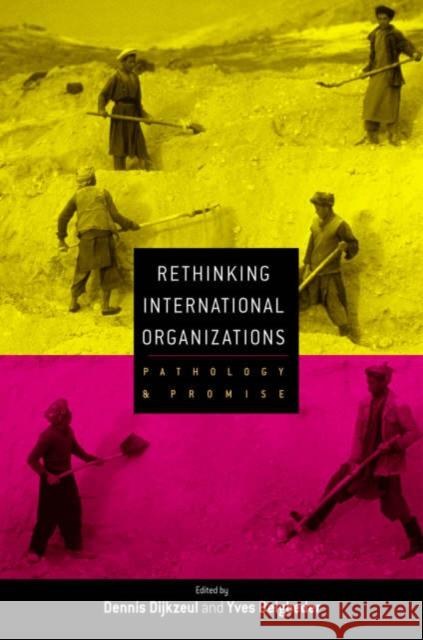Rethinking International Organizations: Pathology and Promise » książka
Rethinking International Organizations: Pathology and Promise
ISBN-13: 9781571816566 / Angielski / Miękka / 2003 / 360 str.
Rethinking International Organizations: Pathology and Promise
ISBN-13: 9781571816566 / Angielski / Miękka / 2003 / 360 str.
(netto: 110,58 VAT: 5%)
Najniższa cena z 30 dni: 115,87
ok. 22 dni roboczych.
Darmowa dostawa!
..".the book is not just honest, it is honest about the tough issues... another] quality of the book that is worth highlighting is its broad and inclusive understanding of what the world of international organisations consist of....it paints a nuanced and comprehensive picture of how the contemporary landscape of international organisations is evolving." - Development in Practice ..". The editors of this book are veteran academic and practitioners in international organizations who have assembled a talented group of European and North American authors with similar experiences ... The result is a first-of-its kind publication that should prove very helpful for anyone teaching about, researching, or participating in the administrative sides of international organizations ... all chapters are well done and several are superb ... Highly recommended." - Choice The management of international organizations is attracting growing attention. Most of this attention is highly critical of both the UN system and International NGOs. Sometimes, this criticism lacks depth or reflects insufficient understanding of these organizations, or is based on narrow, and sometimes biased, internal political concerns of a particular country. International relations theory has insufficiently studied the type of linkages that these organizations provide between international decision-making and Northern fundraising on the one hand, and practical action in the South on the other. As a result, current theory too rarely focuses on the inner functioning of these organizations and is unable to explain the deficiencies and negative outcomes of their work. While the authors identify and describe the pathologies of international organizations in, for example, international diplomacy, fundraising, and implementation, they also stress positive elements, such as their intermediary role. The latter, in particular, could form the basis of more efficient and effective policies, in addition to other recent trends, also described in this volume, that hold hope for a stronger functioning of these organizations in the future. This book presents a long overdue empirical and theoretical overview of criticism on and cures for these organizations. It provides a fundamental rethinking of current approaches to the management of international organizations. Dennis Dijkzeul is Professor in the Management of Humanitarian Crises at the Institute of International Law for Peace and Armed Conflict at the Ruhr-Universitat Bochum in Germany. From 2000 to 2002, he founded and directed the Humanitarian Affairs Program at the School of International and Public Affairs at Columbia University. He has published extensively on the management of international organizations and worked for UN organizations and NGOs in Europe, Africa, and Latin America. Yves Beigbeder is Adjunct Professor at Webster University in Geneva. He started his professional experience at the Nuremberg War Tribunal. He lectures widely on the management of international organizations and is a legal counsel to international civil servants. His latest book is "Judging War Criminals: The Politicsof International Justice."
"...the book is not just honest, it is honest about the tough issues...[another] quality of the book that is worth highlighting is its broad and inclusive understanding of what the world of international organisations consist of....it paints a nuanced and comprehensive picture of how the contemporary landscape of international organisations is evolving." · Development in Practice
"... The editors of this book are veteran academic and practitioners in international organizations who have assembled a talented group of European and North American authors with similar experiences ... The result is a first-of-its kind publication that should prove very helpful for anyone teaching about, researching, or participating in the administrative sides of international organizations ... all chapters are well done and several are superb ... Highly recommended." · Choice
The management of international organizations is attracting growing attention. Most of this attention is highly critical of both the UN system and International NGOs. Sometimes, this criticism lacks depth or reflects insufficient understanding of these organizations, or is based on narrow, and sometimes biased, internal political concerns of a particular country. International relations theory has insufficiently studied the type of linkages that these organizations provide between international decision-making and Northern fundraising on the one hand, and practical action in the South on the other. As a result, current theory too rarely focuses on the inner functioning of these organizations and is unable to explain the deficiencies and negative outcomes of their work. While the authors identify and describe the pathologies of international organizations in, for example, international diplomacy, fundraising, and implementation, they also stress positive elements, such as their intermediary role. The latter, in particular, could form the basis of more efficient and effective policies, in addition to other recent trends, also described in this volume, that hold hope for a stronger functioning of these organizations in the future.
This book presents a long overdue empirical and theoretical overview of criticism on and cures for these organizations. It provides a fundamental rethinking of current approaches to the management of international organizations.
Dennis Dijkzeul is Professor in the Management of Humanitarian Crises at the Institute of International Law for Peace and Armed Conflict at the Ruhr-Universität Bochum in Germany. From 2000 to 2002, he founded and directed the Humanitarian Affairs Program at the School of International and Public Affairs at Columbia University. He has published extensively on the management of international organizations and worked for UN organizations and NGOs in Europe, Africa, and Latin America.
Yves Beigbeder is Adjunct Professor at Webster University in Geneva. He started his professional experience at the Nuremberg War Tribunal. He lectures widely on the management of international organizations and is a legal counsel to international civil servants. His latest book is "Judging War Criminals: The Politicsof International Justice."











